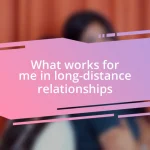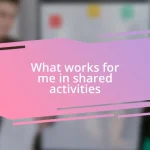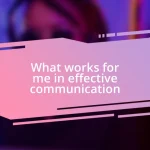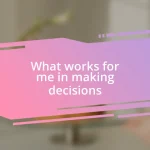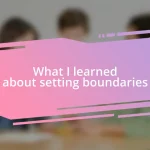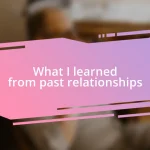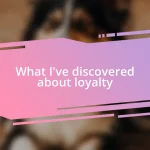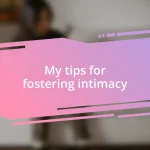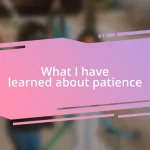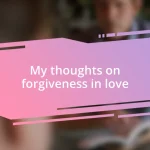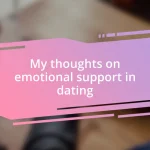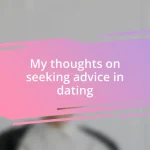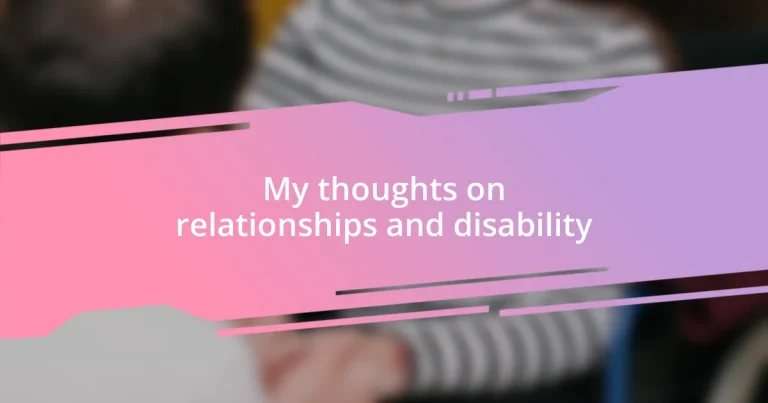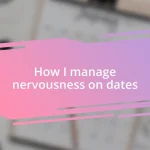Key takeaways:
- Relationships involving disability can deepen emotional connections through shared experiences, understanding, and acceptance.
- Effective communication is crucial, utilizing strategies like active listening, non-verbal cues, and regular check-ins to overcome barriers.
- Supporting one another through adversity not only reinforces bonds but also transforms challenges into opportunities for growth and resilience.
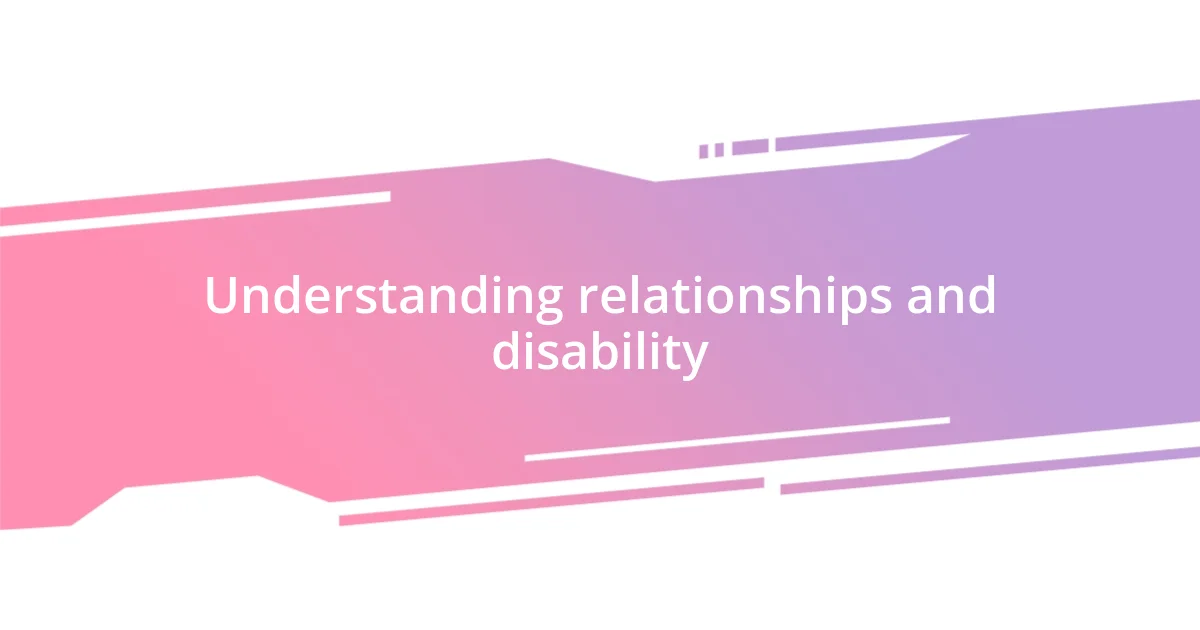
Understanding relationships and disability
Understanding relationships in the context of disability requires a nuanced perspective. Often, I find myself reflecting on how societal views can shape our connections. Have you ever wondered how your perceptions influence your interactions? It’s a deep thought, and I believe many times, people overlook the richness that can come from intertwined lives, regardless of physical or mental challenges.
I’ve had friends who are caregivers, and they share stories that highlight the profound bonds formed out of mutual understanding and respect. For instance, one friend often recounts how her partner’s disability brought them closer; they learned to communicate in ways that transcended words. This made me realize that relationships can become a unique dance—adapting and evolving to embrace both partners’ strengths and vulnerabilities.
Disability might present challenges, but it also opens doors to deeper emotional connections. Can a relationship thrive in adversity? From my perspective, absolutely. When I observe couples navigating the complexities together, I see resilience and love intertwined. Each challenge faced together fosters an unbreakable bond, illustrating that relationships, much like any journey, may be unpredictable yet can lead to beautiful destinations.
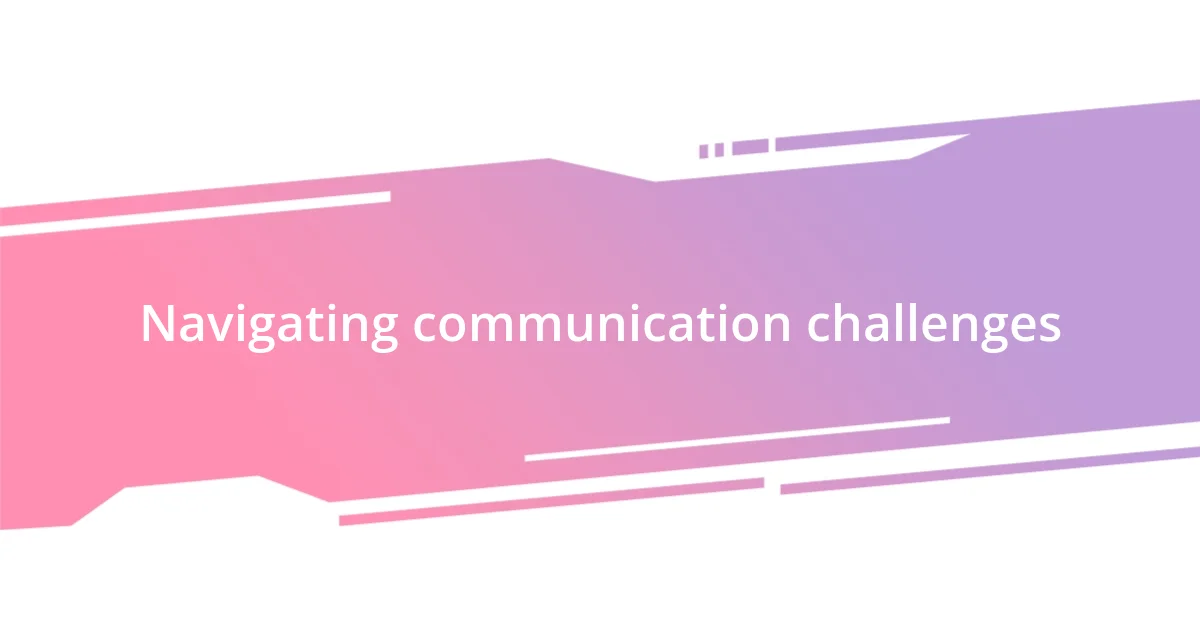
Navigating communication challenges
Navigating communication challenges within relationships that involve disability can feel daunting at times. I’ve come to appreciate that effective communication isn’t just about exchanging words; it’s about understanding each other’s perspectives and feelings. For example, I recall a conversation with a friend whose partner is non-verbal. They developed a unique sign language and expressive gestures that spoke volumes, showcasing how love can flourish without traditional methods of communication.
Here are some practical strategies I’ve observed that can help bridge communication gaps:
- Active Listening: This means really focusing on the other person’s words and emotions. It’s about being present.
- Non-Verbal Cues: Pay attention to body language or facial expressions—they can communicate just as powerfully as spoken words.
- Use of Technology: Assistive devices or apps can facilitate smoother conversations, making it easier to share thoughts.
- Patience and Openness: It’s vital to create an environment where both partners feel safe expressing their needs and feelings.
- Regular Check-ins: Taking time to discuss what’s working and what doesn’t can strengthen understanding and connection.
In my own observations, I notice that these strategies can turn potential barriers into opportunities for greater intimacy. Over time, many couples I’ve seen adapt, fostering a deep bond built on trust and respect, ultimately transforming their communication into something beautiful and adaptive.
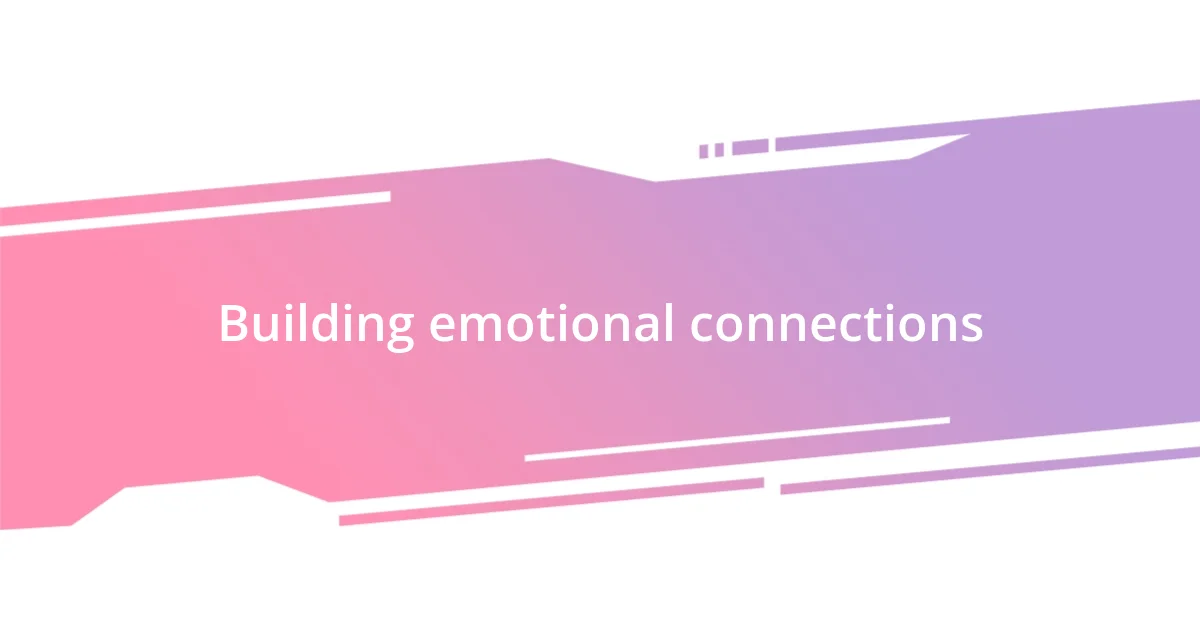
Building emotional connections
Building emotional connections in relationships involving disability can be a transformative experience. I remember a time when I met a couple at a community event; both partners had disabilities. Their ability to connect emotionally was palpable. They shared an unspoken understanding, where even a simple smile conveyed a world of feelings. It inspired me to think about how emotional connections can flourish in the most unexpected ways.
Sometimes, I notice that shared experiences, joint challenges, and mutual support can elevate emotional bonds. A friend of mine once described how their journey with a health condition led them to explore new hobbies together. They discovered the joy of cooking, which wasn’t just about making meals but also about spending quality time. That shared journey helped them create memories that brought them closer, reinforcing the idea that emotional connections can be nurtured through mutual experiences.
Feeling safe and accepted is a cornerstone of deep emotional connections. When I think of relationships where one partner has a disability, I often see how vulnerability plays a crucial role. I once spoke with a woman who shared how she felt liberated when her partner embraced her disability without judgment. This acceptance allowed her to be open and share her fears and dreams. Such emotional honesty can often lead to a powerful connection, paving the way for a bond that celebrates both strengths and vulnerability.
| Key Element | Importance |
|---|---|
| Shared Experiences | Nurtures emotional bonds and helps create lasting memories. |
| Understanding and Acceptance | Fosters deeper connections and promotes emotional safety. |
| Effective Communication | Enhances understanding and addresses needs, enriching the relationship. |
| Resilience | Strengthens partnerships through adversity and shared challenges. |
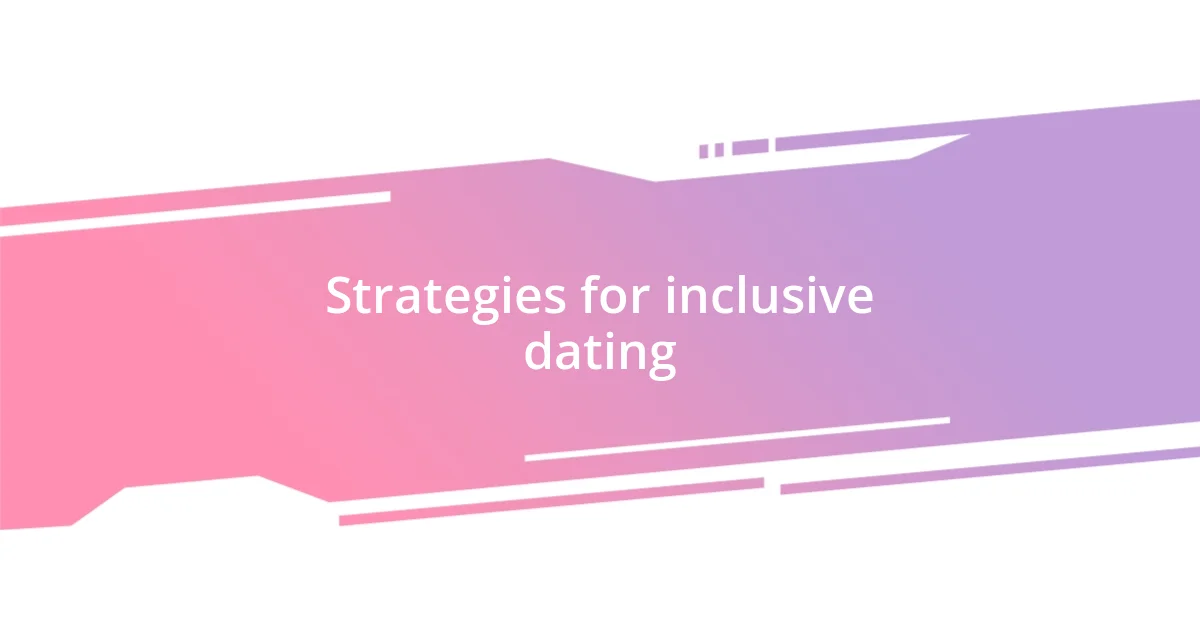
Strategies for inclusive dating
When it comes to inclusive dating, one strategy that resonates with me is the importance of shared interests. I once went on a coffee date with someone who was passionate about art, which opened up a dynamic conversation. We both brought our unique perspectives—mine shaped by my experience in the disability community and theirs through their love for creativity. Finding common ground not only made the date enjoyable but also laid the foundation for deeper discussions about our lives. Isn’t it fascinating how shared passions can cultivate connections?
Another effective strategy is being transparent about needs and expectations. I recall a time when a friend with a mobility impairment shared their concerns about accessibility on a date. They were upfront, which relieved any pressure they felt to navigate their limitations discreetly. This openness turned the evening into a collaborative adventure, where we both sought out locations that accommodated both of our needs. Have you ever noticed how honesty can not only ease tension but also invite partners to genuinely care for one another?
Lastly, I believe that embracing spontaneity can add an enchanting layer to dating. Once, I participated in a last-minute pottery class with someone I dated. Despite both of us feeling a bit nervous about trying something new, it turned into a memorable experience filled with laughter and creativity. Such moments of spontaneity can break down walls, enabling partners to explore their vulnerabilities together. Whether it’s trying a new activity or just grabbing ice cream at midnight, it’s about creating fun memories that enhance the connection. How have spontaneous moments shaped your relationships?
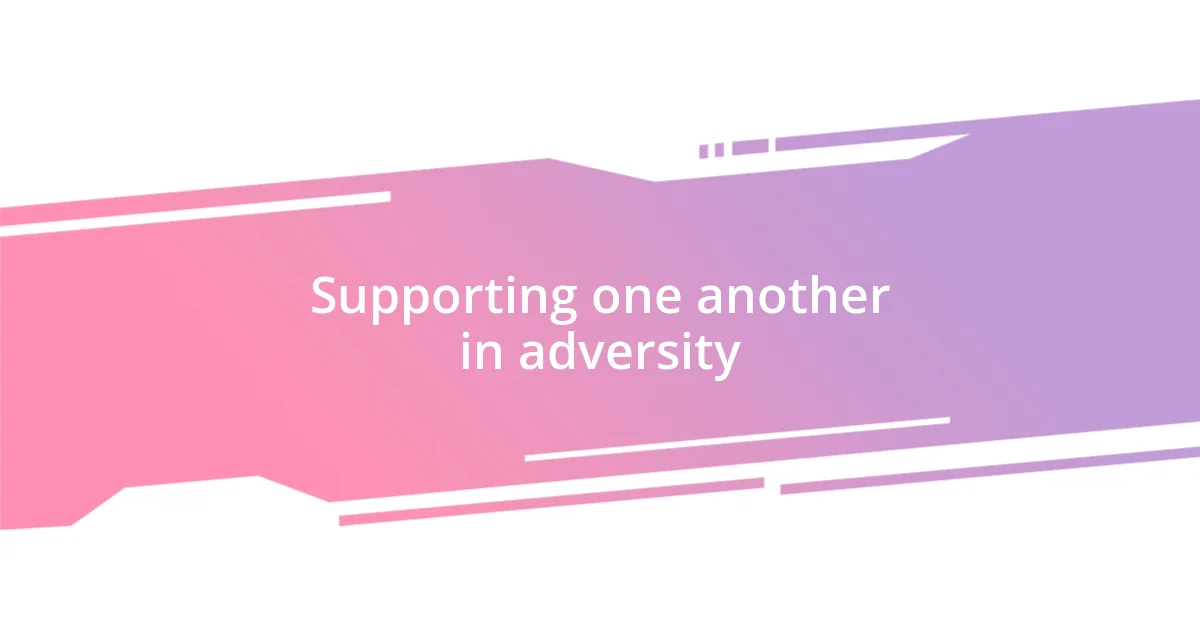
Supporting one another in adversity
Supporting each other through difficult times can truly highlight the strengths of a relationship, especially when disability is involved. I recall a period when a friend faced a particularly challenging health setback. Rather than just offering sympathy, I joined her in daily routines, helping her navigate therapy sessions while keeping spirits high with humor. It made me realize how sharing both burdens and laughter can cultivate resilience together. Have you ever thought about how simply being present can mean the world in tough times?
Understanding each other’s challenges deepens the bond significantly. I remember the moment when my partner opened up about their struggle with anxiety after a hospital visit. Instead of brushing it off, I listened deeply, validating their feelings and sharing some of my own experiences with fear and uncertainty. That exchange wasn’t just comforting for them; it reinforced our mutual commitment to support one another. How transformative can vulnerability be when faced with adversity?
The beauty of battling difficulties as a couple lies in the unique perspective it offers. I’ve seen couples who, while navigating a loved one’s disability, have discovered how to face life’s obstacles with renewed strength. A couple I know began volunteering together at a support group, turning their own adversities into a source of empowerment for others. It made me ponder—how often do we see challenges as opportunities for growth? By uplifting each other, they not only built a stronger bond but also found purpose together.
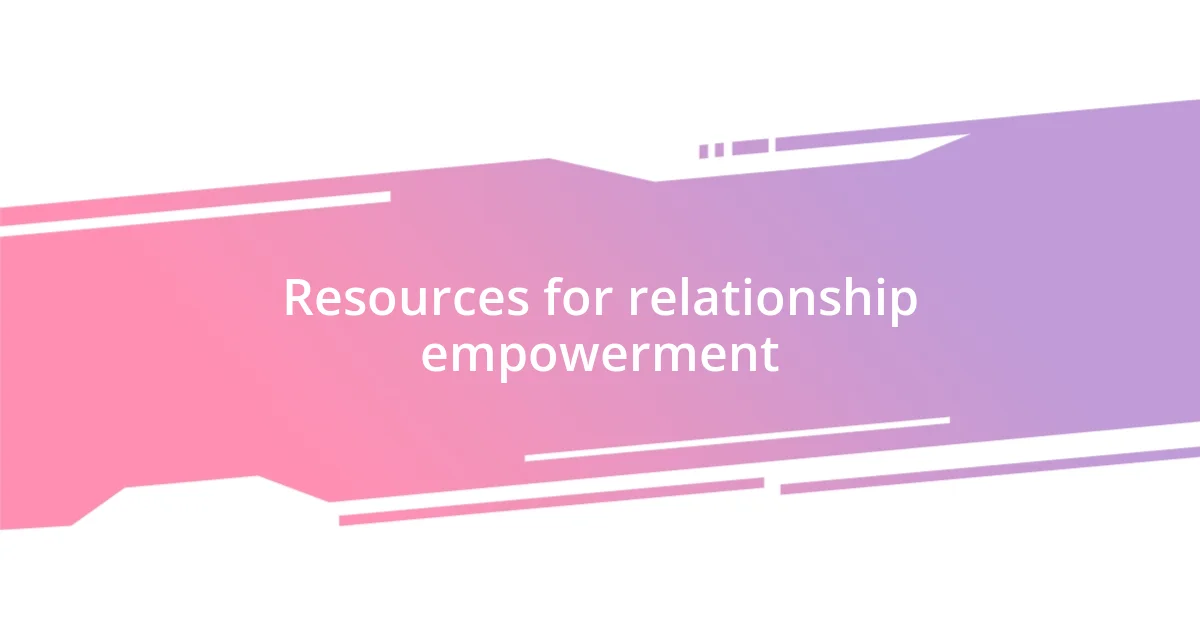
Resources for relationship empowerment
When it comes to relationship empowerment, having the right resources can make a world of difference. I remember discovering a fantastic book focused on relationships within the disability community. The insights it offered about navigating communication barriers truly opened my eyes. Do you ever feel like a fresh perspective can change the way you approach your own relationship challenges?
Support groups also play a vital role in fostering empowerment. I once attended a workshop aimed at couples where we could share our experiences in a supportive environment. What struck me was how each person’s story added layers to our understanding of love and resilience. Have you ever considered how hearing others’ journeys can help you feel less isolated in your own?
Online platforms have become invaluable resources as well. I often find myself scrolling through forums dedicated to relationships and disability. The shared tips and personal anecdotes offered by members encourage open dialogue and foster connection. It’s like having a community invested in your success, reminding you that you don’t have to navigate these waters alone. How empowering is it to know that support is just a click away?
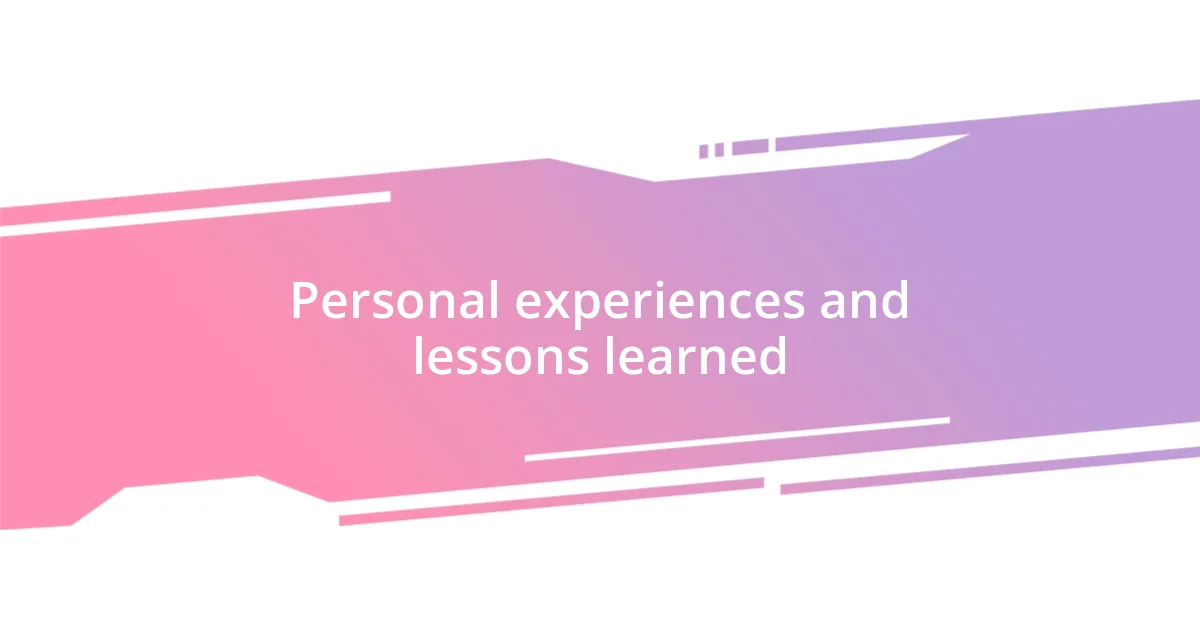
Personal experiences and lessons learned
When I think about my personal journey with relationships and disability, one lesson stands out: the importance of adaptability. I recall a time when my own mobility challenges meant that simple outings became complex plans. My partner and I learned to communicate openly about our needs, turning potential frustration into shared problem-solving. Isn’t it fascinating how adapting to each other’s strengths can transform challenges into teamwork?
There was a moment that truly shook my perspective on support. I was attending a social event when I unexpectedly needed assistance due to fatigue. Seeing friends step in without hesitation was both humbling and uplifting. It taught me that vulnerability doesn’t need to be daunting. Instead, it can foster deeper connections. Have you ever realized that asking for help can actually strengthen your relationships rather than weaken them?
Reflecting on these experiences, I’ve come to appreciate the beauty of empathy in relationships. It’s not always easy, but the moments where I’ve stepped into another’s shoes—truly understanding their fears and aspirations—have enriched my connections immensely. I think about a dear friend who faced a disability diagnosis and found solace in our shared experiences. Sharing those feelings opened a whole new layer of trust between us. Isn’t it remarkable how empathy can bridge gaps that words alone cannot?
